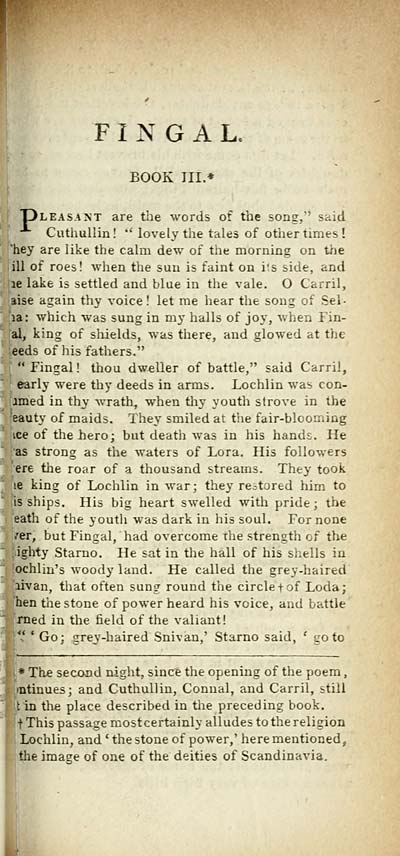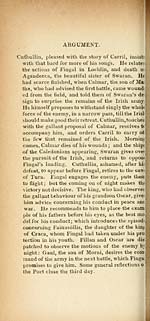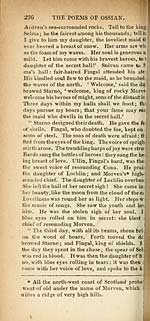Ossian Collection > Poems of Ossian
(343)
Download files
Complete book:
Individual page:
Thumbnail gallery: Grid view | List view

F I N G A L.
BOOK III.*
Pleasant are the words of the sons," said
■^ Cuthullin! " lovely the tales of otiier times !
'hey are like the calm dew of the morning on the
ill of roes! when the sun is faint on i's side, and
18 lake is settled and blue in the vale. O Carril,
aise again thy voice ! let me hear the song of Sel-
la: which was sung in my halls of joy, when Fin-
al, king of shields, was there, and glowed at the
:eeds of his fathers."
" Fingal ! thou dweller of battle," said Carril,
early were thy deeds in arms. Lochlin was con-
imed in thy wrath, when thy youth strove in the
eauty of maids. They smiled at the fair-blooming
ice of the hero; but deatli was in his hands. He
as strong as the waters of Lora. His followers
'ere tlie roar of a thousand streams. They took
le king of Lochlin in war; they re:>tored him to
is ships. His big heart swelled with pride; the
eath of the youth was dark in his soul. For none
/er, but Fingal, had overcome ihe strength of the
ighty Starno. He sat in the hall of his shells in
ochliu's woody land. He called the grey-haired
ii"van, that often sung round the circlet of Loda;
hen the stone of power heard his voice, and battle
rned in the field of the valiant!
" ' Go; grey -haired Snivan,' Stamo said, ' goto
* The second night, since the opening of the poem ,
intinues; and Cuthullin, Conual, and Carril, still
t in the place described in tlie preceding book,
t This passage mostcertainly alludes to the religion
Lochlin, and ' the stone of power,' here mentioned,
^ the image of one of the deities of Scandinavia.
BOOK III.*
Pleasant are the words of the sons," said
■^ Cuthullin! " lovely the tales of otiier times !
'hey are like the calm dew of the morning on the
ill of roes! when the sun is faint on i's side, and
18 lake is settled and blue in the vale. O Carril,
aise again thy voice ! let me hear the song of Sel-
la: which was sung in my halls of joy, when Fin-
al, king of shields, was there, and glowed at the
:eeds of his fathers."
" Fingal ! thou dweller of battle," said Carril,
early were thy deeds in arms. Lochlin was con-
imed in thy wrath, when thy youth strove in the
eauty of maids. They smiled at the fair-blooming
ice of the hero; but deatli was in his hands. He
as strong as the waters of Lora. His followers
'ere tlie roar of a thousand streams. They took
le king of Lochlin in war; they re:>tored him to
is ships. His big heart swelled with pride; the
eath of the youth was dark in his soul. For none
/er, but Fingal, had overcome ihe strength of the
ighty Starno. He sat in the hall of his shells in
ochliu's woody land. He called the grey-haired
ii"van, that often sung round the circlet of Loda;
hen the stone of power heard his voice, and battle
rned in the field of the valiant!
" ' Go; grey -haired Snivan,' Stamo said, ' goto
* The second night, since the opening of the poem ,
intinues; and Cuthullin, Conual, and Carril, still
t in the place described in tlie preceding book,
t This passage mostcertainly alludes to the religion
Lochlin, and ' the stone of power,' here mentioned,
^ the image of one of the deities of Scandinavia.
Set display mode to: Large image | Transcription
Images and transcriptions on this page, including medium image downloads, may be used under the Creative Commons Attribution 4.0 International Licence unless otherwise stated. ![]()
| Early Gaelic Book Collections > Ossian Collection > Poems of Ossian > (343) |
|---|
| Permanent URL | https://digital.nls.uk/77992726 |
|---|
| Description | Selected books from the Ossian Collection of 327 volumes, originally assembled by J. Norman Methven of Perth. Different editions and translations of James MacPherson's epic poem 'Ossian', some with a map of the 'Kingdom of Connor'. Also secondary material relating to Ossianic poetry and the Ossian controversy. |
|---|
| Description | Selected items from five 'Special and Named Printed Collections'. Includes books in Gaelic and other Celtic languages, works about the Gaels, their languages, literature, culture and history. |
|---|

